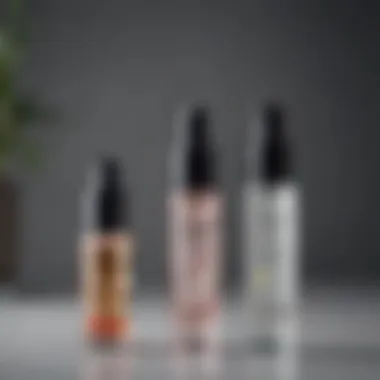Mastering Hydration: Your Essential Guide to Serums


Intro
In the realm of skincare, hydration stands out as a linchpin for achieving a youthful and radiant complexion. Among the myriad of products vying for attention, hydrating serums carve a niche with their potent formulations designed to quench thirsty skin. Unlike heavier creams, these serums deliver moisture deeply, making them an essential component for those looking to enhance their skincare routines. As discussions around achieving optimal hydration gain momentum, understanding the science behind these serums becomes pivotal.
This guide aims to illuminate the landscape of hydrating serums, from the critical ingredients that pack a hydration punch to effective application techniques that ensure maximum efficacy. Whether you have dry, oily, or combination skin, there’s a serum tailored for your needs. In navigating through this article, you will discover how these unique formulations can rejuvenate your skin and restore its natural vitality.
With so many options available, choosing a serum can feel like searching for a needle in a haystack. We’ll break it down into manageable parts, making it easier to find the right fit for your skin profile. Let's delve into the essentials of hydration and why hydrating serums are more than just a passing trend in the beauty industry.
Understanding Hydration in Skincare
Exploring the significance of hydration in skincare reveals a multitude of benefits that extend beyond mere aesthetics. Hydration isn't just about avoiding a dry complexion; it's fundamental to youthful and healthy skin. Proper moisture levels enable the skin to function optimally, serving as a barrier against environmental aggressors, bacteria, and pollution. When skin lacks hydration, it can lead to a host of complications, ranging from irritation to premature aging.
The Importance of Hydration
Imagine hydration as the lifeblood of your skin. Just think of how a well-watered garden thrives, while a parched one wilts. Similarly, adequate hydration helps maintain skin elasticity and suppleness. It plays a pivotal role in various bodily functions, influencing everything from circulation to cell turnover. Without the right amount of moisture, skin cells can become dull, flaky, and unresponsive. Infusing your routine with hydrating serums is a step toward revitalizing and plumping the skin, paving the way for a radiant complexion.
Moreover, hydration helps in enhancing the efficacy of other skincare products. If the skin is properly saturated, it can better absorb and utilize the active ingredients in moisturizers, serums, and creams. It’s like prepping a sponge before you apply any cleaning solution — a dry sponge may leave residue, while a wet one soaks up everything.
How Hydration Affects Skin Health
Hydration is not just about looking good; it's about health too. Well-hydrated skin functions more efficiently and withstands those barely-there scars, fine lines, and wrinkles. If you've ever noticed your skin flaring up during colder months or because of drying products, it’s often because the barrier function has been compromised. Here’s the kicker: well-hydrated skin contributes to a balanced oil production.
For instance, dehydrated skin may trigger the sebaceous glands to produce excess oil to compensate, leading to breakouts. Conversely, hydrated skin fosters an ideal companion for clear, glowing skin.
Additionally, hydration impacts the overall skin tone. Dehydrated skin can appear ashen or sallow, while adequately hydrated skin reflects light beautifully, offering a natural glow. Regular moisturizing routines can help in reducing redness and patchiness, leading to smoother skin texture.
Common Hydration Issues
Despite its importance, many face challenges in maintaining adequate hydration. The following issues are commonplace:
- Environmental Factors: Harsh weather conditions, including extreme cold or heat, can strip moisture from the skin.
- Inadequate Water Intake: Simply forgetting to drink enough water throughout the day can lead to dryness.
- Using Wrong Products: Not all products are suitable for every skin type. Those containing alcohol or fragrances may exacerbate dryness.
- Age: As we grow older, naturally occurring moisture in the skin decreases.
Despite challenges, addressing hydration issues is possible through informed choices. Understanding your skin type helps in selecting the right hydrating serums and formulating an effective skincare routine.
"Hydration is a habit that pays off over time, resulting in skin that feels as good as it looks."
In essence, nurturing your skin with adequate hydration forms the cornerstone of effective skincare, propelling you towards radiant and resilient skin.
Defining Hydrating Serums
Hydrating serums play a vital role in any skincare routine aimed at achieving a plump and radiant complexion. Unlike your regular moisturizers, serums are usually lightweight and formulated with a higher concentration of active ingredients. This makes them exceptionally effective at delivering hydration deep into the skin. It’s like that friend who not just shows up to the party but brings the best snacks!
What Constitutes a Hydrating Serum
To understand what constitutes a hydrating serum, it’s essential to look at its composition. Generally, a hydrating serum combines water-based ingredients and humectants, which draw moisture into the skin. These serums are often formulated as clear liquids or light gels, easily absorbed without leaving a greasy feeling.
Here are the key components:
- Water: The base for many serums, providing an initial layer of hydration.
- Humectants: Ingredients that attract moisture to the skin, enhancing hydration.
- Botanical Extracts: These can add additional benefits, such as soothing or revitalizing the skin.
In short, a quality hydrating serum should be light but potent, allowing deep penetration of moisturizing elements.
Key Ingredients to Look For
When delving into the world of hydrating serums, certain ingredients stand out for their effectiveness. Here’s a closer look:
Hyaluronic Acid
Hyaluronic acid is often the star player when it comes to hydration. This powerful humectant is celebrated for its ability to hold up to 1,000 times its weight in water, making it a must-have in any hydrating serum. Its key characteristic is its moisture-retaining properties, allowing for deep skin hydration and overall plumpness.
Its unique feature is its lightweight texture, enabling it to absorb efficiently without clogging pores. However, it’s crucial to note that hyaluronic acid works best in environments with adequate moisture; in overly dry settings, it might pull water from deeper skin layers.


Glycerin
Glycerin is another humectant that boasts impressive moisturizing capabilities. It attracts water from the air and delivers it straight into your skin. The notable characteristic of glycerin is its versatility; it plays well with a broad range of skin types. The special aspect of glycerin is its non-irritating nature, making it suitable even for sensitive skin. A downside is that, if used excessively, it can create a sticky residue, which may not be everyone’s cup of tea.
Aloe Vera
Well-known for its soothing attributes, aloe vera is also a hydrating powerhouse. It’s rich in vitamins and antioxidants, enhancing the skin’s hydration levels while offering healing benefits. The key characteristic behind aloe vera lies in its natural moisture-locking ability. What sets it apart is its cooling effect, ideal for calming irritated skin. But keep in mind, pure aloe vera can be slightly diluted compared to other hydrating agents, which means it might take a bit longer to see noticeable hydration effects.
Panthenol
Panthenol, or provitamin B5, captures moisture and helps maintain skin’s hydration levels. This ingredient shines due to its ability to convert into pantothenic acid upon absorption, boosting skin barrier function.
Its distinct characteristic is that it not only hydrates but also speeds up healing, making it quite beneficial for those with minor skin irritations. A drawback is that it may not be as well-known, which can make finding products containing panthenol somewhat tricky.
In summary, understanding these key ingredients equips you with the knowledge to choose the right hydrating serum tailored to your skin’s needs. It's all about making informed decisions to ensure your skin stays happy and hydrated.
Evaluating the Best Hydrating Serums
When searching for effective hydrating serums, it’s vital to assess their quality and suitability for your skin. Not all serums are created equal; thus, careful evaluation can make the difference between a glow-up and a skin flop. Understanding what makes a hydrating serum stand out helps you navigate choices that favor your skin’s unique needs. In this section, we’ll explore the criteria for selecting the perfect serum and provide a thorough rundown of the types of products that excel in delivering moisture and nourishment.
Criteria for Selecting a Serum
Skin Type Considerations
Knowing your skin type is fundamental in selecting an appropriate hydrating serum. Oily, dry, or combination skin each has its own quirks, and serums must align with these quirks for optimal effectiveness. What works wonders for dry skin might spell disaster for oily skin.
- Oily Skin: Lightweight, non-comedogenic serums are essential here. Ingredients like hyaluronic acid can hydrate without clogging pores.
- Dry Skin: Richer serums packed with emollients can make miracles happen, sealing in moisture.
- Combination Skin: A mixed approach may work; light serums for areas prone to oil, and richer ones for those parched patches.
Each skin type requires unique attention, and understanding your skin lays the groundwork for a proper hydrating strategy.
Ingredient Quality
The quality of ingredients in a serum is critical. Think of it as building blocks—using poor quality materials can weaken the structure. Opting for products with high-quality ingredients can promote better skin health and hydration. A serum might look appealing but be wary of less-than-stellar components.
Consider:
- Natural vs. Synthetic: Natural ingredients often offer gentler options and fewer irritants.
- Concentration: Higher concentrations of key ingredients such as glycerin or aloe vera can signal a more effective product.
- Additives: Watch out for parabens, sulfates, and unnecessary fillers that can hinder skin benefits.
By focusing on ingredient quality, one can ensure the serum doesn’t just sit pretty on the skin but actually provides the intended hydration.
Brand Reputation
Brand reputation plays a crucial role in building trust. When exploring hydrating serums, it's helpful to look into a brand's history, customer reviews, and their commitment to skin health. A reputable brand often indicates experience and consistently high standards.
Here are a few points to consider:
- Transparency: Brands that openly share ingredient sourcing and production processes are often more reliable.
- Consumer Feedback: Checking reviews can reveal common issues or unexpectedly positive experiences, guiding your choice.
- Sustainability Practices: Brands that prioritize eco-friendly practices show a commitment not just to skin health but to planet health.
Thus, brand reputation becomes a guiding star in the labyrinth of choices, ensuring your selected serum embodies both quality and trustworthiness.
Top Hydrating Serums Reviewed
Once you're armed with criteria for selecting a serum, it's time to delve into some of the most effective hydrating serums on the market. Each type serves different skin needs and preferences, and understanding the nuances can help you find the right fit for your regimen.
Lightweight Formulas
Lightweight formulas offer hydration without weighing you down. Perfect for oily skin or hot climates, these serums absorb quickly and allow your skin to breathe. They often include ingredients like hyaluronic acid, which hydrates while combating oiliness.
- Fast-Absorbing: They penetrate the skin swiftly, ensuring you’re not left sticky.
- Layering Friendly: Ideal for a multi-step skincare routine, they can be easily layered with other products without causing clogging or heaviness.
However, if your skin is on the dryer side, you may need to follow with a heavier moisturizer to lock in hydration.


Rich, Moisturizing Options
On the flip side, rich, moisturizing options are tailored for those whose skin craves deep nourishment. These serums are typically thicker and contain additional oils or butters that help seal moisture into the skin.
- Long-Lasting Hydration: They provide an intense moisture barrier, making them ideal for dry, winter months.
- Comforting Texture: The luxurious feel can be a delightful part of a nightly routine.
The tradeoff may be that they can feel too heavy for oily skin types, although they can be beneficial for night care.
Vegan and Eco-Friendly Choices
In today’s conscious consumer era, vegan and eco-friendly products are breaking ground among skincare enthusiasts. These choices often eschew animal-derived ingredients and are produced with sustainable practices.
- Conscious Choices: For those aligned with a vegan lifestyle or concerned about environmental impact, these serums align perfectly with their values.
- Innovative Formulations: Many brands are now blending popularity with sustainability, introducing serums that effectively hydrate without compromising ethics.
However, the availability and price might dim the appeal somewhat, as premium formulations often come with a larger price tag.
"Your skin is a reflection of what you put into your body and the choices you make."
All of these considerations will help refine your search for the perfect hydrating serum that meets your personal skincare goals.
Application Techniques for Maximum Effect
Application techniques are crucial when considering how to get the most out of your hydrating serums. It's not just about slapping on product and hoping for the best; how you apply a serum can significantly enhance its effectiveness. Various techniques can help ensure that the ingredients penetrate properly and deliver their benefits. Understanding these methods allows you to tailor your skincare routine for optimal hydration.
When to Apply a Hydrating Serum
Morning vs Evening Routine
Using a hydrating serum both in the morning and at night offers unique benefits. In the morning, applying a serum can act as a barrier against environmental stressors throughout the day. That’s a key aspect because daily exposure to sunlight, pollution, and other irritants can deplete skin moisture. Conversely, using the serum at night capitalizes on the skin’s natural regenerative processes; the skin generally repairs itself when you sleep. This leads many to feel the evening application is even more beneficial. Even so, some might find that applying a serum twice a day provides skin with the perfect moisture boost.
A distinguishing feature of morning application is that many serums are designed to create a base for you to layer other products like sunscreen or makeup. When layered correctly, they can work harmoniously, ensuring your skin stays plump and fresh. One disadvantage of morning application could be if it doesn’t absorb well, causing you to feel greasy before makeup. On the other hand, evening applications won’t interfere with other products, allowing for deeper absorption.
Layering with Other Products
Layering a hydrating serum with other skincare products is often considered a game-changer. The idea is to use lighter serums first and then build up to denser formulations. This not only maximizes hydration but also helps maintain skin balance. One key characteristic is that it allows you to customize your regimen based on your skin concerns, whether that’s aging, size of pores, or uneven texture.
Having a serum in the mix is beneficial as it can help lock in moisture from preceding layers. However, over-layering can sometimes lead to clogged pores, so it is important to choose compatible products. Furthermore, using a primer after your serum can enhance makeup adherence, making a smoother canvas for application.
Proper Application Methods
Gentle Patting Techniques
When applying a hydrating serum, gentle patting techniques can make all the difference. Instead of rubbing it in with fingertips, tapping the serum into your skin allows for better absorption. This specific application method helps activate the serum’s potent ingredients more effectively. Another benefit is that it minimizes the risk of overstretching or irritating the skin.
Patting also encourages circulation in the treated area. This is particularly helpful for reducing any puffiness under the eyes or around the cheeks. The unique attribute of this technique is that using light pressure to drive the serum deeper can lead to a more hydrated and plump appearance, particularly for those with dry patches or areas that seem dull. However, if done too vigorously, it could cause irritation in very sensitive skin.
Using a Facial Roller
Incorporating a facial roller into your skincare routine offers not only a delightful experience but also effective application. This method can distribute the serum evenly across your face while simultaneously cooling and soothing your skin. One of the key characteristics of a facial roller is that it can reduce puffiness, thanks to its massaging action, which stimulates lymphatic drainage.
Many users favor using rollers because they're easy to use and can be cooling if kept in the fridge. The unique feature of using a facial roller is that it allows you to build up a sort of ritual; it turns your application into an experience. On the flip side, it requires a bit more time than simple application, but many find the results worth it.
"A well-applied hydrating serum can dramatically alter the overall texture and glow of your skin. It’s all about ensuring it penetrates effectively, allowing you to fully reap the benefits!"
Hydrating Serums for Different Skin Types
Understanding how different skin types respond to hydration is vital to selecting the right hydrating serum. Each skin type comes with its unique needs and challenges. Using the right product ensures optimal moisture levels in the skin, avoiding both over-hydration and dehydration. Choosing a serum tailored to one’s specific skin type not only enhances overall skin health but also addresses specific concerns, ranging from excess oiliness to persistent dryness.
Hydrating Serums for Oily Skin


Oily skin is often a balancing act. The common notion is that oily skin doesn’t need hydration, but that’s a misconception. The reality is simple: these skin types need hydration that doesn’t exacerbate oiliness. Lightweight, water-based serums are typically the best choice. Ingredients like hyaluronic acid are particularly invaluable, as they provide moisture without weighing the skin down. It's paramount that the formulations also include oil-free or mattifying components to maintain that desired balance.
Benefits of hydrating serums for oily skin:
- Lightweight formulations that don’t clog pores
- Quick absorption, leaving no greasy residue
- Improvement in overall skin texture
Hydrating Serums for Dry Skin
With dry skin, hydration is like a lifeboat in a rough sea. People with this skin type often face tightness, flakiness, and sensitivity. Therefore, choosing a hydrating serum that not only adds moisture but also locks it in is crucial. Look for richer formulations that incorporate ingredients like glycerin or squalene. These ingredients can provide essential hydration and help create a protective barrier against moisture loss.
Key aspects to consider:
- Look for thicker textures that can deeply penetrate the skin
- Choose serums with added oils to nourish and hydrate
- Essential vitamins, like Vitamin E, for additional skin barrier support
Hydrating Serums for Combination Skin
Combination skin can be the trickiest of the bunch, needing hydration tailored to different zones on the face. Those with this skin type often have an oily T-zone combined with drier cheeks. The ideal hydrating serum should cater to both needs without causing further imbalance. A serum that offers both hydration and a little oil control is perfect. Look for light, gel-like formulas that blend well across diverse skin areas.
Benefits include:
- Able to address multiple concerns at once
- Hydrates without overloading any particular area
- A balanced approach to achieving soft, supple skin
Sensitive Skin Considerations
Sensitive skin is like a ticking time bomb when it comes to hydration. It hangs in the balance between hydration and irritation. Choosing a hydrating serum for sensitive skin means being more discerning. Look for serums that are fragrance-free and contain calming agents such as aloe vera or chamomile. These elements help nourish while soothing any existing irritation. Always test a small patch before fully committing to a new product.
Consider the following:
- Opt for hypoallergenic and non-comedogenic formulations
- Prioritize serums rich in antioxidants to protect against environmental damage
- Always incorporate natural extracts that are known to calm and heal
Common Myths and Misconceptions
Understanding the common myths surrounding hydrating serums is crucial for anyone serious about skincare. These myths can lead to poor product choices and ineffective routines. Knowing the truth about these misunderstandings not only helps in selecting the right products but also enhances overall skin health and appearance. In the realm of hydration, misinformation can be rampant, and it’s essential to sift through these misconceptions for a clearer perspective on what works.
Myth: Oils Replace Hydration
One prevalent notion is that facial oils can replace the need for hydration from serums. While it’s true that oils provide moisture, they do so differently than hydrating serums. Oils create a barrier on the skin that locks in moisture, but they do not provide hydration to the skin itself. Think of oils as a protective shield. They’re great for sealing in moisture, especially after you apply a hydrating serum, which penetrates the skin and delivers water and nutrients directly.
If you’re relying solely on oils for hydration, you might notice your skin feeling tight or looking dull over time. The reality is that your skin’s hydration levels depend significantly on the water content, provided mostly by serums that contain ingredients like hyaluronic acid or glycerin.
Incorporating both oils and hydrating serums in your skincare routine can yield better results. When used together, you can achieve a plump, dewy complexion by first hydrating the skin, then locking in that moisture with oil.
Myth: All Serums are the Same
Another common misconception is that all serums are essentially the same, which could not be further from the truth. While many serums might share ingredients or marketing buzzwords, their formulation, concentration, and overall effectiveness can vary significantly.
Some serums are designed for targeted issues such as brightening, anti-aging, or treating specific skin concerns—each with unique compositions tailored to address particular needs. For instance, a serum with a high concentration of hyaluronic acid is more likely to hydrate the skin effectively compared to one with filler ingredients that don’t contribute much to skin hydration.
When selecting a serum, it's vital to consider your skin type and concerns. A serum made for oily skin may not suffice for someone with dry skin, and vice versa. Understanding the formulation and matching it with your skin’s requirements is key.
Ultimately, recognizing the differences among serums, and debunking these myths ensures that you’re not only investing in the right products but also achieving the skin hydration your complexion deserves.
By navigating these common myths, you empower yourself to make informed decisions about your skincare. Hydrating serums are immensely beneficial but need to be seen in the proper light to deliver their full potential.
The End
As we wrap up this guide, it’s clear that understanding hydrating serums is crucial for anyone looking to elevate their skincare game. Hydration is not just about slapping on any old product; it’s about selecting the right serum that aligns with your skin’s specific needs. From dry to oily types, the right hydrating serum can provide lasting moisture, improve texture, and even combat signs of aging.
One of the key takeaways from this article is the importance of ingredient awareness. Understanding what works for your skin plays a vital role in product effectiveness. For example, hydrating heroes like hyaluronic acid and glycerin can help draw moisture into the skin, while hydrating botanical extracts soothe and nourish.
**"A good hydrating serum not only quenches your skin's thirst but also protects it from external aggressors."
Moreover, we discussed how timing and technique in applying these serums impact their efficacy. Applying your serum on slightly damp skin, for instance, can enhance absorption and effectiveness. This highlights the notion that hydration isn’t a one-size-fits-all approach.
Reflecting on common myths also underscores an essential point: hydration goes beyond just moisture content. It’s about balance, the right ingredients, and daily habits that promote a holistic approach to skincare. Misconceptions about oils replacing hydration can lead users down a path of frustration, emphasizing that moisture retention is key.
In closing, enhancing your skincare routine with a suitable hydrating serum can yield significant results. It's an investment in your skin’s health, and by prioritizing hydration, you pave the way to a more radiant complexion. This journey into hydration is one that any individual—regardless of age—can embark on, thus ensuring that everyone can achieve their optimal skin health.



